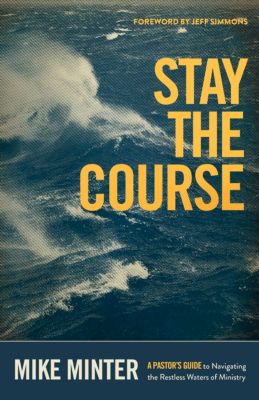
Ministry burnout is nothing new, but it doesn’t have to be the end of the story—there is joy in staying the course.
By Marissa Postell
Today, 63% of pastors say they are stressed, 48% say they are discouraged, and 43% say they are struggling to balance work and home life. Pastoral ministry is hard. Emerging from a pandemic and facing cultural crises at seemingly every turn, pastors may find themselves struggling now more than ever to stay the course in ministry—to faithfully live out their calling over time.
Mike Minter, founding pastor of Reston Bible Church in Northern Virginia, experienced a long and faithful vocation as pastor. Now, he is burdened to help younger pastors navigate the turbulent waters of ministry with joy. In his book, Stay the Course, Minter shares his heart to help pastors make it through ministry intact.
Whether you’re a new, young pastor or an older, experienced pastor, Minter’s words serve as an encouragement for you to stick to your calling and believe the Lord is stronger than any opposition you face. Ministry burnout is nothing new, but Minter believes it doesn’t have to be the end of the story—that there is joy in staying the course. Here’s a look at our conversation:
What are some things that you have seen that make pastoral ministry hard?
Mike Minter: One thing that’s difficult is that we are paid by the very people we’re telling every week how bad they are. We’re pointing out people’s sins. We’re teaching the Word of God, which is exhortative and can be very convicting.
“One thing that makes pastoral ministry difficult is that we are paid by the very people we're telling every week how bad they are. We're pointing out people’s sins.” — @PastorMinter Click To TweetWhat also makes it difficult is that you’ve got lots of different ears hearing different things based on what you say. Terms and words don’t all mean the same thing in every context. So you want to be crystal clear in defining what you say.
Another thing that makes it difficult is that people in the church have no problem emailing you or telling you something you did wrong, or that they’re going to leave the church unless you change this view, or that they didn’t like the music. It has upside-down challenges you wouldn’t normally have. I don’t have any control over whether people leave or not.
On the flip side of that, what has been the biggest joy of pastoral ministry for you?
Certainly, seeing people come to Christ has been huge through the years. I always present a clear message of the gospel at the end of my message. It becomes the solution to the tension of the message, no matter what it is.
It’s been a huge blessing seeing marriages restored and prodigals coming back home just through the power of sitting down with people and walking them through their problems. There are so many blessings through the years of people who have expressed appreciation of the power of the Word that’s delivered every week, of the care of the church for them, and of the power of visiting people in the hospital, walking people through hard times, and then seeing them come out of those hard times.
When you look broadly at the state of pastors today, what concerns you most?
Pastors right now are dealing with things I never had to deal with. COVID was a big thing and trying to get people back to church. And the internet has ways of presenting Christians as hostile, puritanical, negative toward society, hypocritical, and judgmental. And, certainly, there are some that fall into that category, but not very many. Whenever you put things on the internet, people buy into that narrative, and that makes it very difficult for pastors today. They’ve got to equip their people to understand love is not to be construed as agreement, and disagreement is not to be construed as hate.
“Pastors must equip their people to understand love is not to be construed as agreement, and disagreement is not to be construed as hate.” — @PastorMinter Click To TweetDo you have a story of a key experience or lesson that you learned that helped you to navigate some of the struggles of pastoral ministry?
When somebody is upset with something and leaving the church, I want to have an exit interview with them. It’s interesting to find out how many people are mad about something that never occurred, or that they thought occurred, or they interpreted a certain way.
If we are defensive toward people who have an issue with a message we’ve given, or the music that’s played, or whatever, that never goes well. The best thing to do is to listen carefully and humbly. And if you can, own up to some things you know are true in what they’ve said. If one out of 10 things they’ve said is right, take ownership of that one thing. They will receive that as a humble response, and that breaks down barriers. Then you can ask questions to start navigating the discussion without being defensive. But I think the key thing is: You’re willing to dialogue.
Why is it important for a pastor to remember his calling in ministry?
God’s calling is His enabling. When I was called to ministry, I heard the Lord say, “Quit your job and teach the Bible the rest of your life.” So, when I came across difficult times—and in over fifty years, I’ve come across difficult times—I would go back to that and say, “Was that my calling?” I’m still alive. So, I’m going to keep teaching the Bible.
Sometimes pastors run across deep, troubling waters, and they think they’re going to capsize. And they jump ship before they even find out whether they’re going to capsize. It’s important to not just “hang in there” but to say, “By the grace of God, this is His church, not mine. He called me. I’m going to lead it to the end.” And then lead and see what happens.
I would encourage a pastor to go back and say, “When did I really feel this calling? What did it look like? What was the sense of it? And why would I ever think I’m not called anymore?”
What should young pastors know about how ministry impacts their families?
The seeds you plant at the beginning are what grows. When I started the church, I stood before the body. And I said, “Today I’m going to speak on the role of the pastor and the role of the pastor’s wife.” So, I talked for about 40 minutes on the role of the pastor, and I took one minute to talk about the role of the pastor’s wife. I said, “There is no role.” There’s nothing in the Bible that says, “Here’s what a pastor’s wife is.” She will be involved because she’s got gifts. But it set a stage so the people didn’t have expectations. Make sure your wife doesn’t feel like she’s under any special burden. Find out what her giftings are and put her in that area—not other areas.
Why is pride so dangerous in pastoral ministry?
Well, Proverbs says that pride comes before destruction and a haughty spirit before a fall (Proverbs 16:18). God resists the proud and gives grace to the humble (James 4:6). I would rather humble myself before God than be humbled. If you try to exalt yourself, He’s going to humble you. Humility doesn’t come naturally to anyone. So, when a ministry starts growing, particularly when people start praising you for a gift, you’ve got to be careful.
“Humility helps melt the people that come in with a hard heart.” — @PastorMinter Click To TweetI knew early on that I had a gift of being able to communicate, and I kept hearing it over and over and over. But I had to fight against letting that go to my head. Humility helps melt the people that come in with a hard heart. They suddenly see somebody that’s gentle and kind, and it breaks down the barriers.
In what ways is the word “endurance” helpful for pastors who are looking ahead at the road of pastoral ministry?
Endurance has to be spirit-led. There’s a human endurance that comes from a type of pride of “I’ll show you.” But that’s a different type of drive. That type of drive is temporal. It doesn’t have an eternal value to it.
Paul said in 1 Corinthians 15 that he labored more than all of them, “yet not I, but the grace of God that was with me” (1 Corinthians 15:10, CSB). That laboring was enduring. But that endurance was God’s grace in His life to face those battles. It wasn’t Paul saying, “I’m a tough guy. I can do this.” It was: “I am able to do all things through him who strengthens me,” (Philippians 4:13, CSB).
There have been times I thought I couldn’t do this another minute. But God would come in and say, “You’re not going to do this. I’m going to do it.”
What would you tell the pastor who needs to be reminded of the joy of staying the course in ministry?
If you give up, you have no idea how many blessings were right over the next line that you didn’t know about. The idea of giving up ought to get out of the vocabulary of a pastor. If I really was called, then I’m going to not just hang in there. I’m going to rest in the grace of God to get me through this for the next step—for the long haul—so I don’t end with a lot of regrets. There is joy in staying the course in ministry.

For permission to republish this article, contact Marissa Postell Sullivan.









